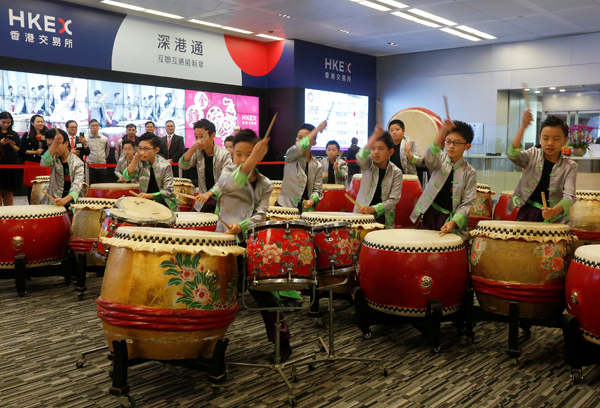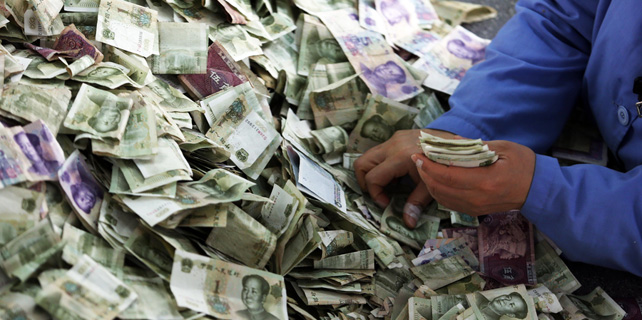Tight liquidity, regulations to hit Shenzhen SME board
 |
|
Schoolboys perform with Chinese drums as part of a ceremony marking the first day of trade after the Lunar New Year at the Hong Kong stock exchange on Feb 1. [Photo / Agencies] |
Next six months may well see even ChiNext weakening a bit
The overall performance of the Shenzhen small-and-medium enterprise board and the Nasdaq-style ChiNext board will be weaker in the first half of 2017 in the face of tightening liquidity and stricter regulation, experts said.
Hong Hao, chief strategist at BOCOM International Holdings Co, said he remained prudent about the performance of Shenzhen SME board and the ChiNext board in the first six months.
Hong said: "China is tightening the liquidity and the market interest is rising, which is not good for boards with high risks."
China's central bank tightened monetary policy by raising the interest rates it charges in open-market operations and on funds lent via its standing lending facility in February as it attempted to rein in asset prices and inflation.
But Hong said the newly launched Shenzhen-Hong Kong Stock Connect can be good for the mainland and Hong Kong markets. It in turn will help the opening-up of China's capital market, and global investors will seek opportunities in companies listed on the SME board and the ChiNext board, which signify China's new economy.
The Shenzhen-Hong Kong Stock Connect, the second link between the mainland and Hong Kong bourses, was launched on Dec 5, 2016.
A Beijing-based portfolio manager at a Chinese leading fund management company who declined to be named said the market value of most shares on the SME board and the ChiNext board will be shrunk in the first half of 2017, and a few shares will offer investment opportunities.
He said: "The tightening liquidity is a main negative factor for the stock market performance."
Hong added that China's securities regulator had cracked down on illegal activities in 2016 and some popular shares listed on the Shenzhen SME board and ChiNext board were no longer attractive for investors.
The China Securities Regulatory Commission uncovered and fined 183 illegal deals in 2016 and the penalties amounted to 4.3 billion yuan ($626 million), increasing 288 percent year-on-year. There were 38 people banned from the securities industry, an increase of 81 percent year-on-year, according to CSRC data.
Hong said: "The action of the China Securities Regulatory Commission is important for the long-term development of the A-share market, but the performance of the Shenzhen SME board and the ChiNext board will be negatively influenced in the short term."
Hong added that well-performed companies and bad ones would be more easily recognized by the market, so the badly-performed companies would have higher financing costs.
Ma Wenya, general manager of Sunday Fund Co Ltd, however, showed confidence in the SME board and the ChiNext board for 2017 and he forecast 20 percent of the shares would double their stock price.
"There are affluent funds in China, but ways to invest are limited," said Ma. "Tighter capital outflow regulations and property purchase restrictions will make more funds flow to the A-share market."
Ma said investors would also seek opportunities before an upcoming registration-based IPO system is put in place.
There are indicators that a registration-based IPO system is coming as the Chinese regulator accelerated the approval of initial public offerings this year.









